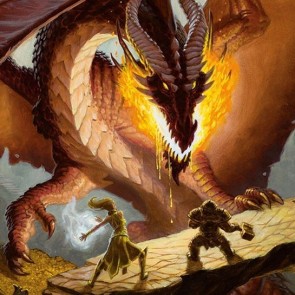There was a time when I could give an educated opinion on almost every new board game release. I made a point of playing them all, and ultimately writing a review. But last week I watched from afar as my friends attended BGG.Con, and I realized that I didn’t recognize most of the games. It wasn’t that I hadn’t played them. I wasn’t even aware of their existence. At no point in my “gamer” years have I ever felt so distant from the hobby that once meant so much to me.
But a couple of days later something else occurred to me. I was in a bookstore in Manila and was perusing their display of Dungeons & Dragons books. To my surprise, they already had numerous copies of Eberron: Rising From The Last War, the new 5e version of the old campaign setting. I had my eyes on this release, but I hadn’t expected it to make it to this side of the Pacific Ocean so quickly. Needless to say I nabbed that right away. That’s when it occurred to me: I’m no longer a board gamer who dabbles in D&D. I’m now a D&D player who plays board games on the side.
This is not an unusual situation. A lot of people play one game to the exclusion of others. I just didn’t think I would end up as someone with a “lifestyle game.” If I am perfectly honest, I generally looked down on people who played a single game to the exclusion of all others. They were missing out! They weren’t interested in experiencing the full breadth of the hobby! But as I’ve become one of those “lifestyle” gamers, I have seen some big advantages to focusing time and energy on a single game system.
Many of those upsides revolve around the removal of choice. This seems like a strange thing to say, but humans actually don’t care much for extensive choices. We like choosing from three things, rather than 150. There’s a reason why some of the most successful board game designs have offered players a narrow range of choices, because for the average person choice is an easy thing to overdo. At any rate I have seen this played out in my own life. We've all stared at our game shelves, vainly trying to decide what to play. I no longer have to worry about what games to bring to game night, because most game nights will actually just be D&D.
It also removes that little hassling voice telling me what I should and should not play. This was especially bad when I was in the thick of the review treadmill. Invariably there would be some mediocre new release that needed to get played, even though I would generally rather play Cosmic Encounter or Argent again. So the things I really enjoyed about the hobby were being deferred, which is not a way to engage with a hobby at all.
This has especially become a challenge in the last few years as the rate of board game releases has ramped up. My inability to recognize new releases says as much about the growth of board gaming as it does about my own disconnection from it. Focusing on the releases from a single product line has been a huge corrective for me. Wizards of the Coast releases 2-3 new D&D books every year, and for a game that has as huge a scope as D&D that is more than enough content to last any group. I can’t follow the tide of every new board game release, but I can offer insight into why I’m excited for the newest published D&D adventure.
As a result I think I’m actually spending less on gaming than I have for most of the past ten years, while still enjoying the things I buy much more. I want to be careful here because one pastime among gamers is to prove that our hobby really isn’t as much of a money-sink as it is. And to be perfectly fair, my ability to spend less on D&D now is predicated on larger purchases I made a few years ago, like buying all of the core rulebooks with birthday money. But we also live in a time where it’s common for board games to cost over $80 at full retail, at which point a $50 sourcebook seems less extravagant. While that’s a ridiculous amount for a hardcover book, the age of the $50 board game is rapidly fading. Once you start adding in expansions, some games can creep over the $100 price tag. It’s always expensive to be a gamer, but walking away from keeping up with new board game releases has relieved some of the financial demands for me
Don’t misread me, lifestyle games can be expensive. Magic: The Gathering and Warhammer 40K are living proof of that, and because they have robust organized play scenes some people will always have the desire to stay abreast of the current meta. That says nothing of all of the side purchases that supplement your favorite game. Whether it’s sleeves for Magic, paints for Warhammer, or minis for D&D, there’s no end of stuff on which you can spend your money. And there will always be a need to stay current with releases when you follow a particular product line. It’s not a coincidence that the most successful lifestyle games come from large companies like Wizards of the Coast and Games Workshop. Those companies have the money to keep their games alive with well-paced new releases and robust organized play.
But following a game from a large corporation has its advantages too. Chief among them is that it’s easy to find a way to play. If you live in a major city, your odds of being able to find a game of Dungeons & Dragons or Warhammer are quite good. At the very least, you will likely be able to find the products nearby. That structure of organized play is a boon here too, because even if you aren't an organized play person, most game stores will run some version of what you like to play. This unity extends to the online community for these games, if only because board game discussions are so much more fractured. Say what you will about edition wars, but at least you are discussing the merits of the same game.
And the built-in community is really where I’ve found the strength of a lifestyle game the most. Games of all kinds are a great source of connection, and a lifestyle game can be a little spot of common ground between people from different places. It’s not unlike two cultures that at least share a common language. Finding like-minded people with whom you can enjoy something you already love is one of life’s great pleasures. Focusing on a single game has been the best way for me to facilitate that human connection, which is why we do this hobby in the first place.
 Games
Games How to resolve AdBlock issue?
How to resolve AdBlock issue? 






















